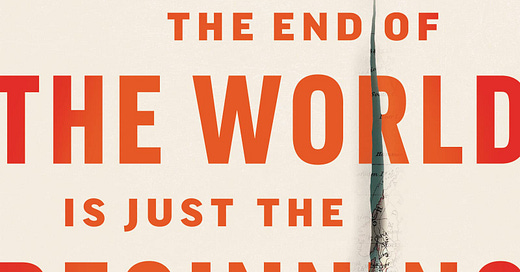The End of the World Is Just the Beginning: Mapping the Collapse of Globalization by Peter Zeihan
4/5
Peter Zeihan is what you would call a “doomer” – a jaded onlooker warning of civilizational collapse. This book did not exactly convince me that the world was ending, but it did underline the extremely fragile and contingent nature of our globalized present. Zeihan identifies three Horsemen of the Apocalypse that are going to end civilization as we know it: demographic collapse, security vacuums, and supply chain breakdowns. Even if you disagree with his apocalyptic framing, you can learn a lot about how globalization operates from reading his argument.
Demographics are changing across the planet in an unprecedented way: Almost all societies are getting older. Large rural labor forces are no longer needed for agriculture and the world is thus urbanizing rapidly. Urbanization lowers birthrates mostly because it makes having a lot of children a financial burden rather than a benefit. You would think a net reduction in mouths to feed would be positive in terms of lowering environmental stress, but the problem is that the entire global economy has been built on an assumption of continuous growth. Young people earn, build, and consume more, whereas older people (though wonderful and cherished) are technically an economic burden on states. Current population charts have already baked-in many old people and very few young people. Absent a sudden revolution in politics and technology, we are soon going to see a gigantic drop in global economic activity this decade as a result following mass retirements of Baby Boomers, as well as an inability to fill critical labor roles.
The End of the World Is Just the Beginning is written with an assumption that the U.S. is pulling back its foreign security guarantees. I’m not sure this is actually happening, but if it did it would endanger many of the supply chains that make the modern world possible. A security vacuum that led to even one or two attacks on global shipping routes would be enough for globalization to end tomorrow, because the entire system is based on an economic assumption of absolute security. The Iran-Iraq War led to a few attacks on ships and that almost destroyed the global insurance industry until Reagan stepped in to bail it out and restore order. If supply chains become insecure because the seas become a no-man’s land absent the U.S. Navy, they will simply stop operating because the economics will break down. Developing countries will lose their economically-vital export markets, leading to social chaos, while developed countries will lose access to vital goods, also leading to social chaos. Countries have specialized production to serve a global market and very few have capacity to become self-sufficient today. A breakdown in global supply chains will be the worst for food and lead to major famine in many countries.
It’s hard to tell how much China-skepticism in the United States is simply a product of wounded pride, but Zeihan takes a frankly apocalyptic view about China’s future due its ageing demographic profile and low-quality manufacturing base. He just asserts China is going to be a hellscape within a few decades and doubts whether it will even survive as a unitary state. By contrast, he is relatively positive about America’s future in a post-globalized world, seeing the Western hemisphere as one place with the right mix of labor price arbitrage, climatic variation, stable security, and natural resources needed for success. The rest of the planet may well descend into a Hobbesian struggle of all against all. He seems to view that as a certainty.
Zeihan has an impressive breadth of knowledge and has written a fascinating book despite his distractingly glib writing style. (This is very weird, he writes about civilizational holocaust as though he’s discussing a gag comedy sketch.) I learnt a lot about how the modern world was constructed from this book, including about the mechanics of supply chains, agriculture, and energy – as well as how it all might plausibly unravel.



